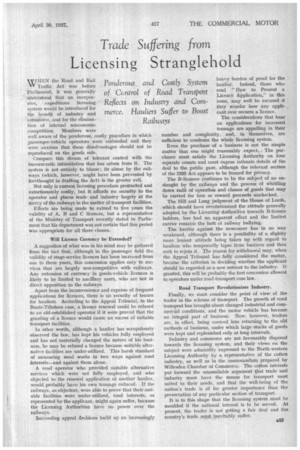Trade Suffering from
Page 123

If you've noticed an error in this article please click here to report it so we can fix it.
Licensing Stranglehold
WHEN the Road and Rail Traffic Act was before Parliament, it was generally tinderstood that an ineXpen • sive, expeditious licensing system would be introduced for the benefit of industry and commerce, and for the elimination of internal uneconomic competition. Members were well aware of the ponderous, costly procedure in which .passenger-vehicle operators were embroiled and they were anxious that these disadvantages should not be reproduced on the goods side.
Compare this dream of tolerant control with the bureaucratic intimidation that has arisen from it. The system is not entirely to blame ; its abuse by the railways (which, however, might have been prevented by forethought in drafting the Act) is the greater evil.
Not only is current licensing procedure protracted and extortionately costly, but it affords no security to the operator and places trade and industry largely at the mercy of the railways in the matter of transport facilities.
Efforts are being made to extend to five years the validity of A, B and C licences, but a representative of the Ministry of Transport recently stated in Parliament that his department was not certain that this period was appropriate for all three classes.
Will Licence Currency be Extended?
A suggestion of what was in his mind may be gathered from the fact that, although in the passenger field the validity of stage-service licences has been increased from one to three years, this concession applies only to services that are largely non-competitive with railways. Any extension of currency in goods-vehicle licences is likely to be limited to ancillary users, who are not in direct opposition to the railways.
Apart from the inconvenience and expense of frequent applications for licences, there is no security of tenure for hauliers. According to the Appeal Tribunal, in the Bouts-Tillotson case, a licence renewal could be refused to an old-established operator if it were proved that the granting of a licence would cause an excess of suitable transport facilities.
In other words, although a haulier has scrupulously observed the law, has kept his vehicles fully employed and has not materially changed the nature of his business, he may be refused a licence because suitable alternative facilities are under-utilized. This harsh standard of measuring need works in two ways against road interests—and against them alone.
A road operator who provided suitable alternative services which were not fully employed, and who objected to the renewal application of another haulier, • would probably have his own tonnage reduced. If the railways, as objectors, were able to prove that their suitable facilities were under-utilized, road interests, as represented by the applicant, might again suffer, because the Licensing Authorities have no power over the railways.
Succeeding appeal decisions build up an increasingly heavy burden of proof for the haulier. Indeed, those who read "How to Present a Licence Application," in this issue, may well be excused it they wonder how any applicant ever secures a licence.
The considerations that bear on applications for increased tonnage are appalling in their number and complexity, and, in themselves, are sufficient to condemn the whole licensing system.
Even the purchase of a business is not the simple matter that one might reasonably expect. The purchaser must satisfy the Licensing Authority on four separate counts and must expose intimate details of the deal to the public gaze, although the relevant section of the 1933 Act appears to be framed for privacy.
The B-licensee continues to be the subject of an onslaught by the railways and the process of whittling down radii of operation and classes of goods that may be carried for hire or reward proceeds unchecked.
The Hill and Long judgment of the House of Lords, which should have revolutionized the attitude generally adopted by the Licensing Authorities towards B-licence holders, has had no apparent effect and the limited carrier remains the butt of railway bullying.
The barrier against the newcomer has in no way weakened, although there is a possibility of a slightly more lenient attitude being taken up with regard to hauliers who temporarily lapse from business and then seek to rejoin it. The reason for withdrawal may, when the Appeal Tribunal has fully considered the matter, become the criterion in deciding whether the applicant should be regarded as a new entrant to the industry. It granted, this will be probably the first concession allowed to operators under road-transport case law.
Road Transport Revolutionizes Industry.
Finally, we must consider the point of view of the trader in the scheme of transport. The growth of road transport has brought about changed industrial and commercial conditions, and the motor vehicle has become an integral part of business. Now, however, traders are, in effect, being coerced into returning to the old methods of business, under which large stocks of goods were kept and replenished only at long intervals.
Industry and commerce are not favourably disposed towards the licensing system, and their views on the subject were admirably expressed to the North-western Licensing Authority by a representative of the cotton industry, as well as in the memorandum prepared by Willesden Chamber of Commerce. The cotton interests put forward the unassailable argument that trade and industry must have the means for transport most suited to their needs, and that the well-being of the nation's trade is of far greater importance than the preservation of any particular section of transport.
It is to this shape that the licensing system must be moulded if the national interest is to be served. At present, the trader is not getting a fair deal and the country's trade must inevitably suffer.








































































































































































